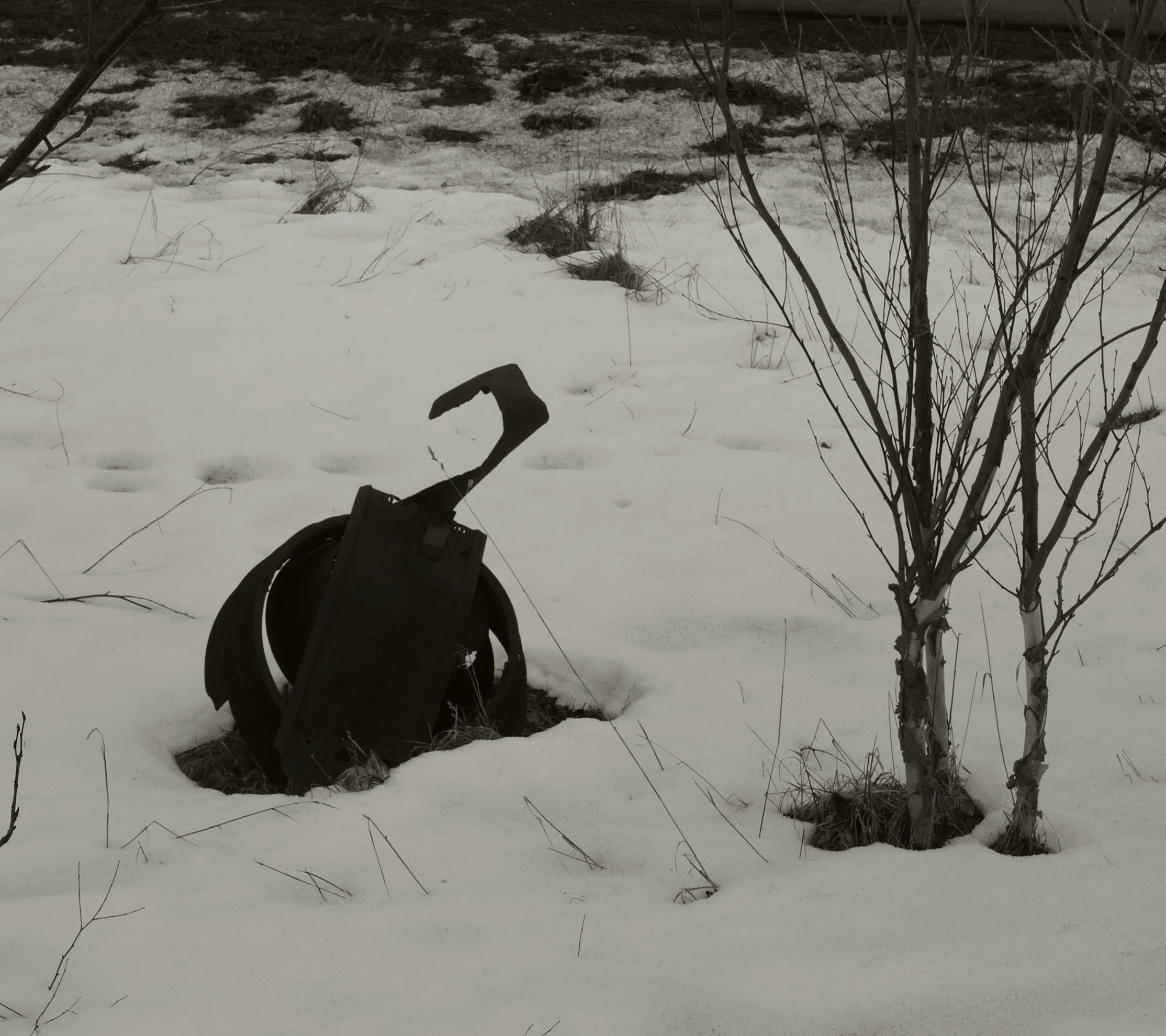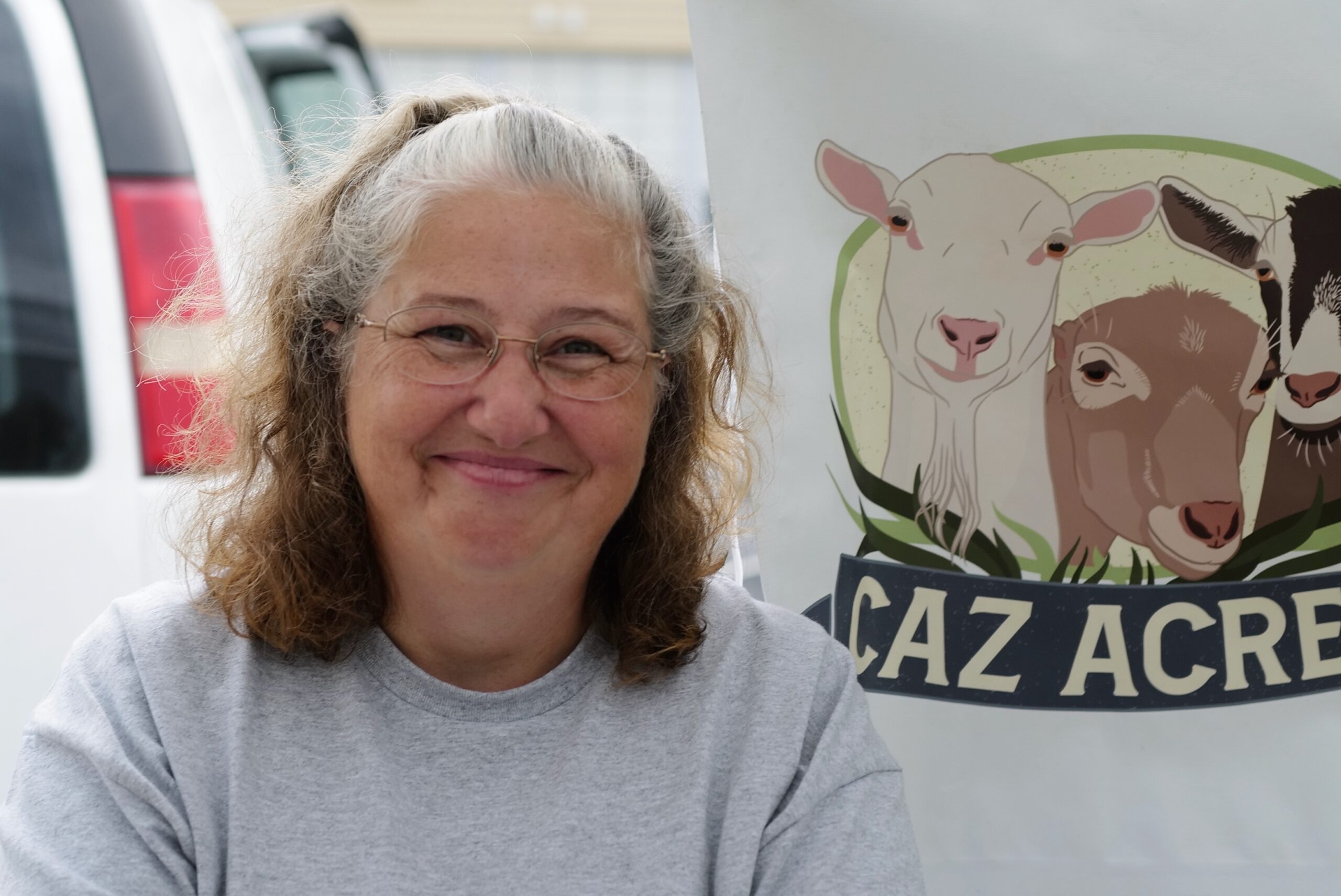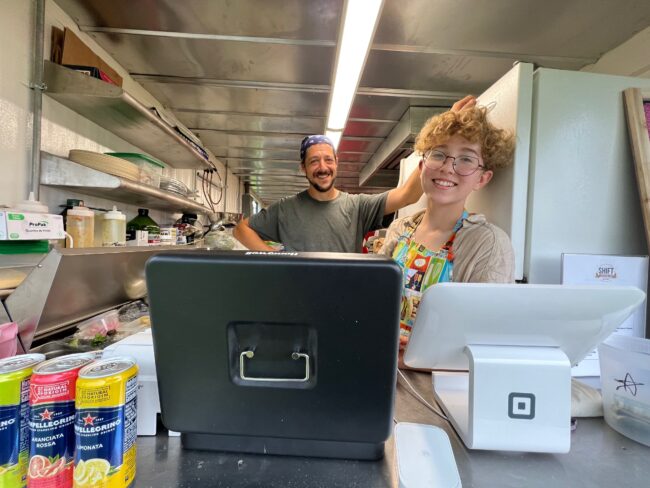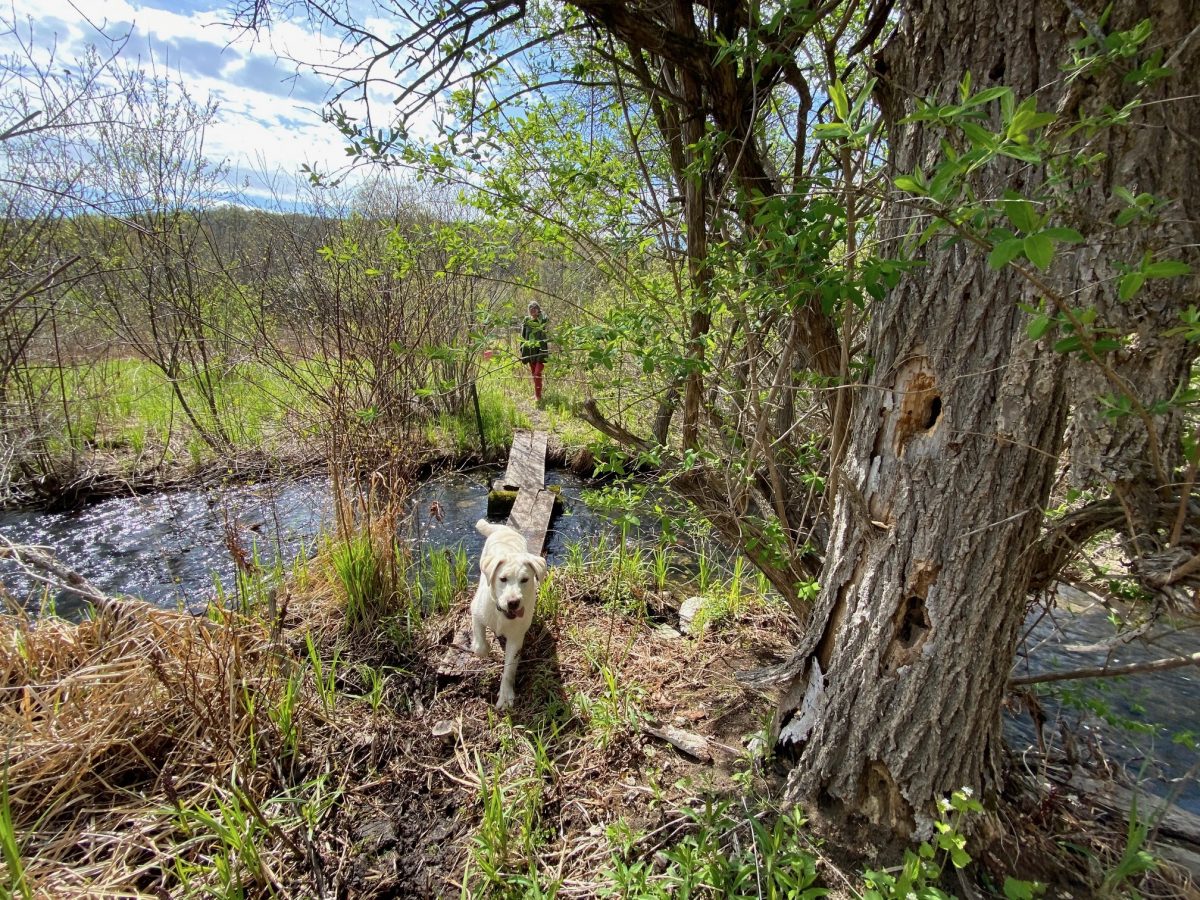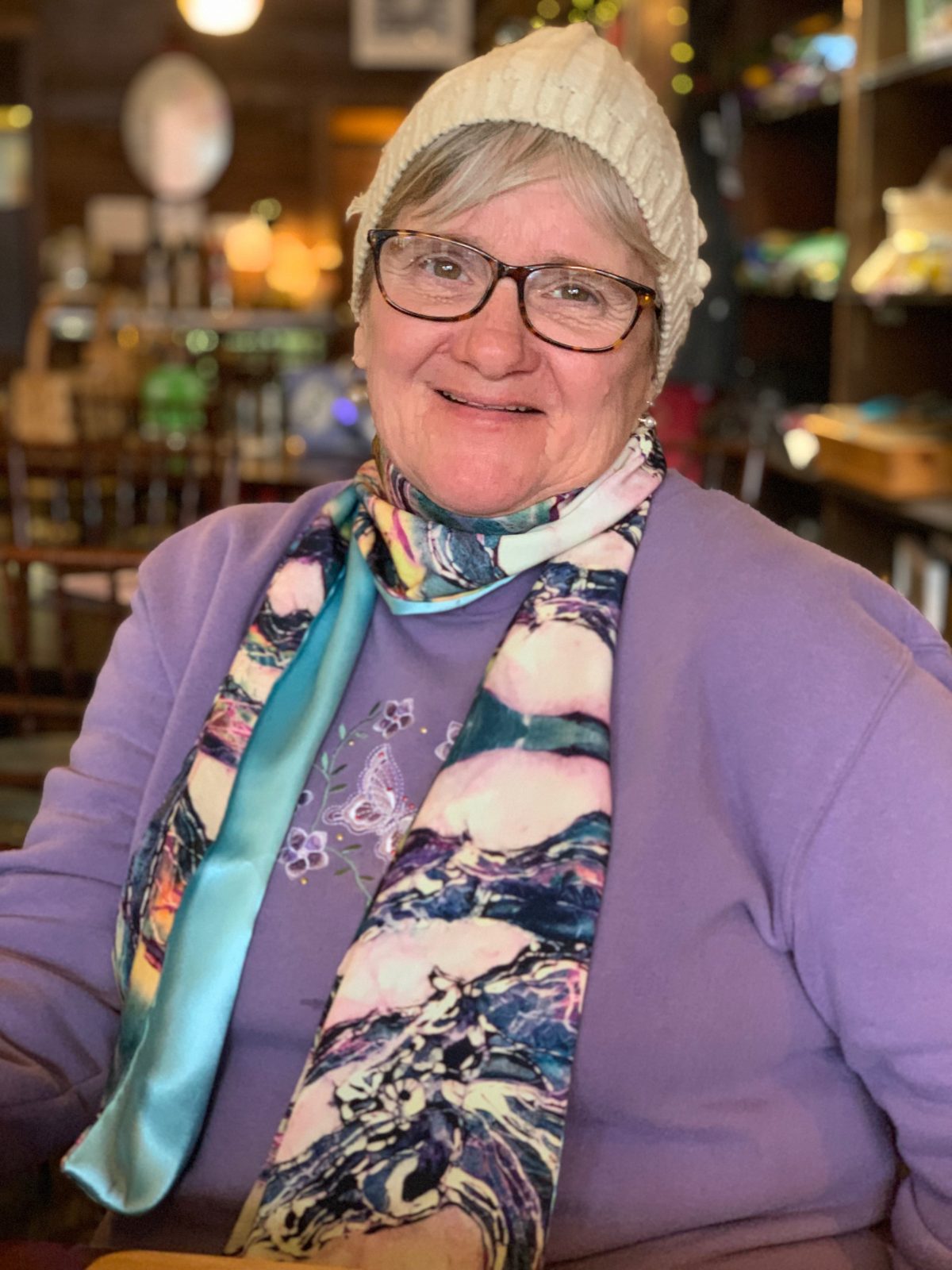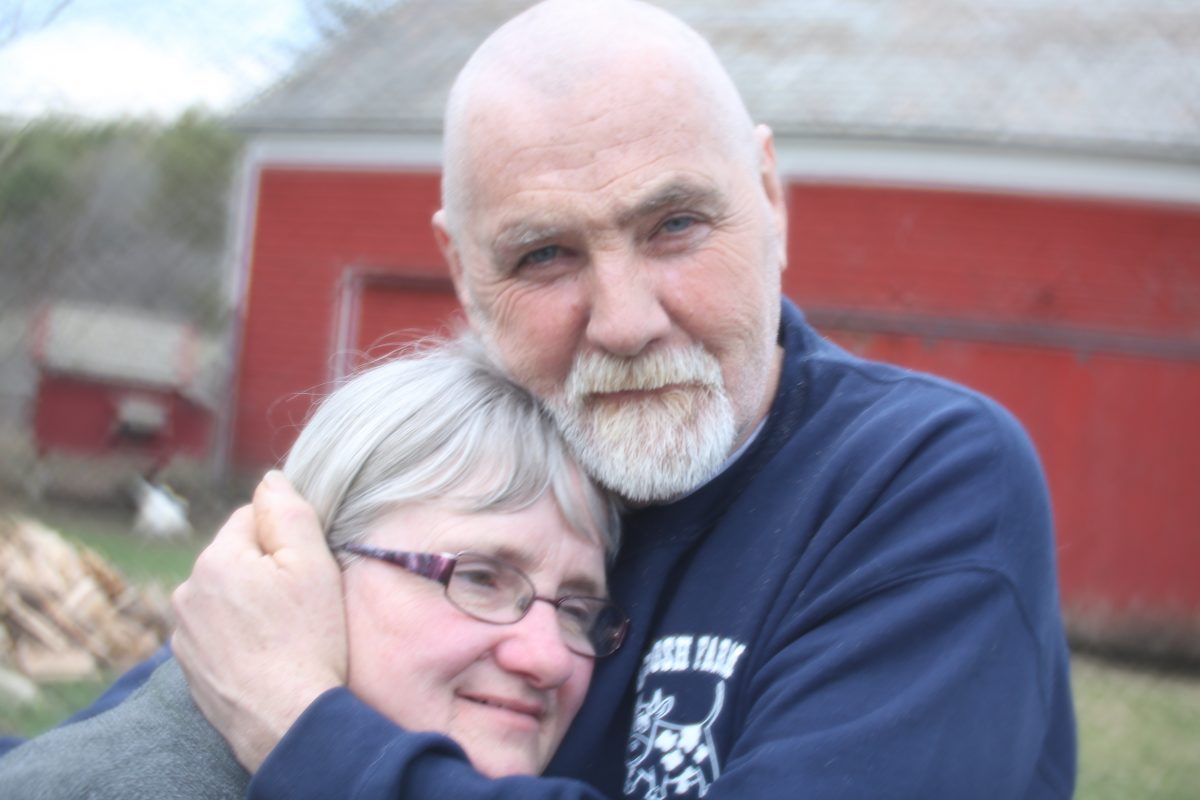Zinnia loves the Ed Gulley Memorial Bridge, even though she usually just jumps into the water and foregoes the bridge. More than a year after Ed’s death, his wooden deck is still secure and functioning well.
In the short time, I knew Ed – too short – he affected my life in many ways. Ed was a big man, in soul and heart, and he was always thinking of ways to do things for Maria and me and our farm.
He was always doing good for somebody, he just loved to help people.
He surprised us by building the bridge that connected us to our woods, he dragged a bench out into the woods for us to sit on, his creative and evocative sculptures still define our yard.
Friendship has always been complicated for me, but especially so in recent years, and it had little to do with being older. One friend and I had a quarrel, and he says he’d love to talk with me, but doesn’t mean it. He lies to me almost every time we talk.
Another committed suicide. And Ed died of brain cancer. I have a couple of lovely friendships developing with women, whom I mostly talk with on the phone. They are very good friends to me.
Once in a while, I’ll have lunch with a man, but we rarely do it again. I’ve come to terms with my idiosyncratic nature and have found peace in my life at last. I have no complaints.
I think in some ways I was closer to Ed than anyone except Maria.
Some people just get me, and some people don’t. I can make people uncomfortable without even trying, but I could say anything to Ed, and he could say anything to me. And he did.
We just loved each other.
I never asked Ed for a bridge or a bench in the woods. I couldn’t imagine building one with two planks, some nails, and a metal fence post.
Ed just thought it was ridiculous to own all those woods and never go and see them or walk in them. He couldn’t put up with it. We walk in those woods almost every day. If you talk about a friend who has your back, that would be Ed.
I was grateful to Ed for his help, and he was grateful to me for my encouragement of his art. He and Maria connected very warmly as artists. When he made something he was proud of, he had Carol text me and asked me to come over.
Ed had no use for texts or e-mail or cell phones, you talked to him face to face, or not at all.
As I came to know Ed, I saw that as much as he loved his cows and farm, he was weary of the hard labor and continuous financial struggle. He was thinking all the time about change, about living off of his mind and spirit.
When I was in trouble, Ed appeared, without ever being asked. I don’t know how he knew.
When a big black bear got hit by a truck outside the farmhouse and fled into our tall grass to hide, Ed stayed over to help wait for the police, find the bear, shoot him out of his misery, and then take the body home.
Ed handled his brain tumor with his usual decisiveness and bravery.
He knew there was no cure, and didn’t want to put himself or his family through the often medieval procedures doctors recommend, mostly because they are trained to always do something, and don’t know what else to do.
Ed asked me to write about his death, do videos with him, and come by as often as I could to talk to him. As he got sicker, he begged me to help him die. It was the only time either of us turned the other down.
Like me, he was careful about getting too close. But we did sometimes.
I was sitting with him for an hour or so while Carol went to the grocery store, and he looked up from the pen and pencil set I brought him, and just said: “I love you, man.”
And he teared up.
I’m sure we both had the same thought: we weren’t going to see much more of one another, we would never know how our stories would turn out.
I took his hand and said “I love you, too, Ed. You are a very good man.” It was hard on me, sitting there day after day, watching this vital and proud man have his sheets changed.
But I was very glad to share the experience with him in this small way. He loved the videos we made. Like me, Ed is not shy in front of a crowd.
He also wanted me to write a book about him until I told him he wasn’t Winston Churchill, and he cracked up.
I got the feeling that Ed was the only person who wanted me around as he failed, and I do understand that, although it was painful too. I came by because Ed asked me to, I believe he was glad I was there and was able to bring him what he needed to paint and draw and write his poems, most of which I didn’t love, and told him so.
But I do know when I am wanted, and when I make people uneasy.
I’ve only had contact with one of his children and his family since his death, the ties that bound us to them seemed to melt away after he died. The friendship is best remembered through wind chimes on the porch, sculptures on the lawn, and bridges to the woods. I think of Ed every time I pass by the giant metal good he made for our front lawn.
I hope Carol has healed somewhat and resumed living if she can and is ready. I know she had an awful time.
I wish her well. She loved Ed dearly. We talked once or twice after he died, but I’ve not heard from her since. I respect the distance.
Mostly, I miss the strong and loving friendship with Ed.
I have pretty much given on on friendships with men; perhaps I have too many issues with my father. I don’t trust most men to get too close to them or them to me. The funny thing was I completely trusted Ed, and on the surface, we could hardly have been more different.
We did both have issues with our fathers, who were critical of their sons.
Maria says at the core we were both very similar.
We were both storytellers; we had large personalities, we had substantial egos, a very similar kind of humor, and a sense of having a mission in the world. Neither of us was ever nervous in front of a crowd, and we both had big mouths that could get us into trouble. We were both full of ideas and full of ourselves.
There is fraternity in that.
Ed could be belly-laughing funny, and so could I. We laughed a lot when we were together. Big strong men don’t always respect someone like me, whose only tool is his mind, whose physical work is typing. But Ed respected me as a man who had done a lot in life, and I respected him in the same way.
Perhaps our most robust connection was a creative one.
We were both driven to create, every day of our lives, and felt great joy in the process. He loved to sit down with me and talk about his future life as a sculpture; he had a million plans for his next chapter.
Up until the end, I thought he would do it.
The family was very much Ed’s life, unlike me, and we both had a love for the country and the role of the farm. Ed loved his grandchildren, but he wasn’t much for soccer games or school events – his heart was on the farm and his cows.
Ed could fix anything, and I can fix nothing, but there was a tremendous creative connection.
During one of our last talks, I told him he would probably talk the ears off the angels, and he said he couldn’t wait to annoy them. We could always get each other to laugh, and to awaken.
He would drone on forever about the price of milk, and I came to memorize his milk story, which never changed. He was frustrated by the small-mindedness and passivity of farmers, who let every administration for the past half-century screw them every year.
He disliked Donald Trump and had no respect for him, but he voted for him in the hopes he would trash the power structure in Washington. I don’t know if he was happy with Trump or not, towards the end, he wasn’t paying much attention.
He believed me when I encouraged him, it meant a lot to him, and his affection for me – I’m not exactly a farmer tied to my crops and cows – meant a lot.
I feel some heartbreak when I cross the Gulley bridge, it was such a thoughtful thing for him to build, and we use it so often. And I always smile at the thought of Ed. If he is up there looking down at me, I am sure he has a lot to say about the things that should be done on the farm.
I am still amazed that two long planks of wood and metal pool have stood up so well for a few years. I told him I was going to call it the “Ed Gulley Memorial Bridge,” and he just laughed.
“Why?” he asked.
I said I was doing that before he died because I doubted anybody else would do it after he was gone. He thought that was one of the funniest things he had ever heard.

